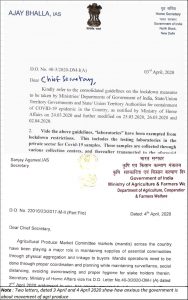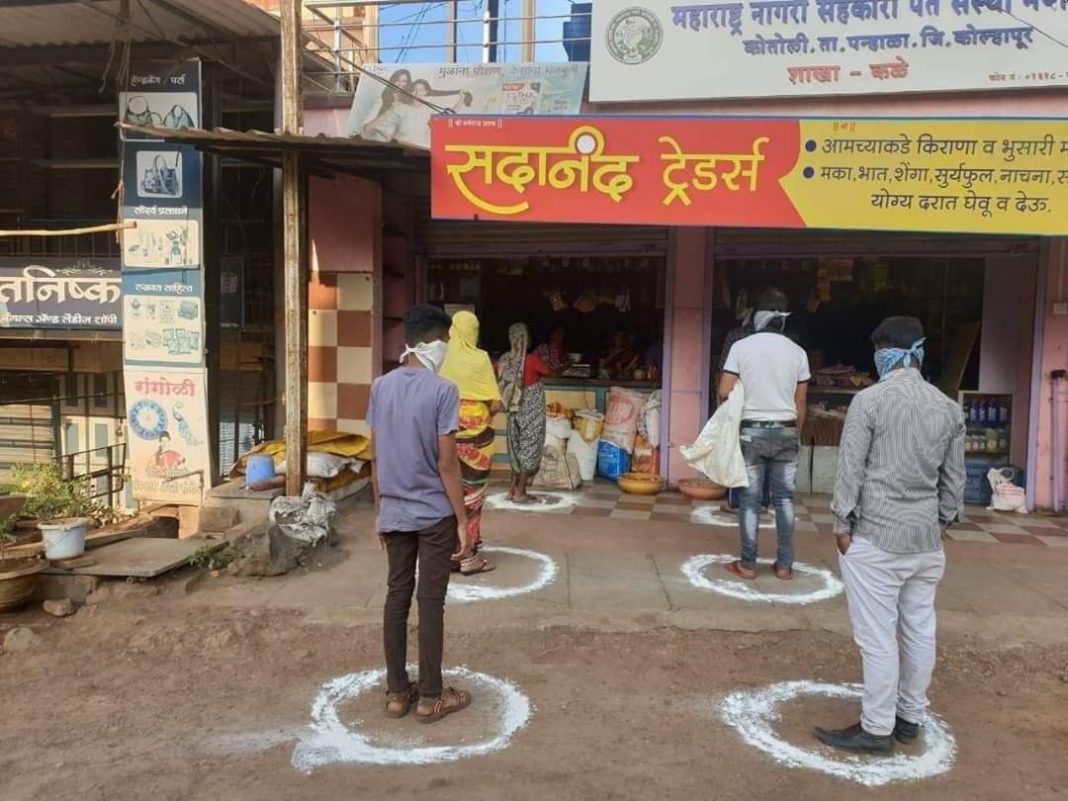https://www.freepressjournal.in/business/amid-coronavirus-lockdown-govt-stresses-on-need-to-exempt-transport-of-all-agriculture-products-from-restrictions
Covid-19
Firefighting on the agriculture front
RN Bhaskar – 8 April 2020
The central government has moved swiftly to contain what could be both a humanitarian disaster and a political blunder. On 3 April, Ajay Bhalla, home secretary, government of India wrote to all chief secretaries (2020-04-03_covid19_DO Letter dated 3.4.2020 to Administrators and Chief Secretaries with clarification on smooth flow of essential goods and services). The letter stated that the government had exempted “laboratories” “from lockdown restrictions”. That was understandable. But the letter also stated that the government had exempted all agri produce similarly from such restrictions.
 The letter stated “exceptions to sale (including through eCommerce), production, warehousing and transport of essential goods such as food, groceries, fruits and vegetables, dairy and milk products, meat and fish, animal fodder, seeds, fertilizers and pesticides, agriculture produce, drugs, pharmaceuticals, medical devices, their raw material and intermediaries have been specifically mentioned in the aforesaid guidelines. In my letter dated 29 October, 2020, it was clarified that grocery would include hygiene products such as hand washes, soaps, disinfectants, body wash, shampoos, surface cleaners, detergents and tissue papers, toothpaste / oral care, sanitary pads and diapers, charger and battery cells etc.. . . . . Additionally, exceptions to sale (including through eCommerce), production, warehousing and transport of essential goods such as food, groceries, fruits and vegetables, dairy and milk products, meat and fish, animal fodder, seeds, fertilizers and pesticides, agriculture produce, drugs, pharmaceuticals, medical devices, their raw material and intermediaries have been specifically mentioned in the aforesaid guidelines. In my letter dated 29 October, 2020, it was clarified that grocery would include hygiene products such as hand washes, soaps, disinfectants, body wash, shampoos, surface cleaners, detergents and tissue papers, toothpaste / oral care, sanitary pads and diapers, charger and battery cells etc.”
The letter stated “exceptions to sale (including through eCommerce), production, warehousing and transport of essential goods such as food, groceries, fruits and vegetables, dairy and milk products, meat and fish, animal fodder, seeds, fertilizers and pesticides, agriculture produce, drugs, pharmaceuticals, medical devices, their raw material and intermediaries have been specifically mentioned in the aforesaid guidelines. In my letter dated 29 October, 2020, it was clarified that grocery would include hygiene products such as hand washes, soaps, disinfectants, body wash, shampoos, surface cleaners, detergents and tissue papers, toothpaste / oral care, sanitary pads and diapers, charger and battery cells etc.. . . . . Additionally, exceptions to sale (including through eCommerce), production, warehousing and transport of essential goods such as food, groceries, fruits and vegetables, dairy and milk products, meat and fish, animal fodder, seeds, fertilizers and pesticides, agriculture produce, drugs, pharmaceuticals, medical devices, their raw material and intermediaries have been specifically mentioned in the aforesaid guidelines. In my letter dated 29 October, 2020, it was clarified that grocery would include hygiene products such as hand washes, soaps, disinfectants, body wash, shampoos, surface cleaners, detergents and tissue papers, toothpaste / oral care, sanitary pads and diapers, charger and battery cells etc.”
The letter went on to add that “At the ground level different interpretations are being made on the items given exceptions, which hinder smooth flow of supply chain of these essential items. Suggestions have been received from some quarters in regard to these Guidelines. . . . . . Queries have been received as to what constitutes food and grocery. Since it is neither feasible nor desirable to mention each item of food and grocery in the guidelines, the State/UT Governments are advised to interpret these terms to mean all items of food and grocery that are usually consumed by people on day to day basis.”
The letter takes away at one stroke any discretionary power that policemen or self-styled officials exercise. It thus smoothened the movement of all items of daily use, including “inter-state and intra-state movement of all trucks and other goods / carrier vehicles with one driver and one additional person . . . . . Movement of driver and one person from their place of residence to truck should also be facilitated by local authorities. All movement of persons with the passes shall be subject to strict adherence to norms for hygiene and social distancing as is required in the context of C0VID19.”
It was now clear that the government has begun preparing for availability of items of daily consumption, especially when the lockdown is eased in stages. What remains to be seen is how many drivers report for work, as they themselves may be worried about being contaminated. It is not known whether they too will be provided protection clothing by the government.
The letter of the home secretary was followed by the very next day with another from the agriculture secretary, Sanjay Agarwal (2020-04-04_Covid19_0_0_New Doc 2020-04-04 17.36.15). This letter too is marked to all the chief secretaries across the countries urging them to allow farmers to sell their produce anywhere, including outside mandi areas. It urges chief secretaries to waive any provisions of the APMC (Agricultural Produce Market Committee) Acts in the respective states that seek to hinder the free movement of agri produce and its sale anywhere within the state. This should be done, stated the letter, “while maintaining surveillance, social distancing, avoiding overcrowding and proper hygiene for stake holders therein”. It urges farmers to sell their produce directly from warehouses as well, without the need to bring them to the mandis.
The order according to NCDEX officials covers both grains and vegetables and fruit. While some states like Maharashtra have already permitted farmers to sell their produce directly to households or to cities without going through the mandis, many other states have not done this. Say Kapil Dev, executive vice president and head of products and business development at NCDEX, “both letters together help ease the movement of agricultural produce and will go a long way towards empowering small and marginal farmer producers.” The provisions that enable small farmers to get dematerialised receipts from WDRA warehouses, allows them to sell their produce at market prices instead of selling them at distress prices because of being located far away from mandis.
Both circulars, read together, are the first attempt to create a national market for agri produce, breaking down state and municipal barriers. These provisions should go a long way towar5ds empowering farmer producers in seeking out new markets and enabling urban clusters to enter deals directly with farmer producers to ensure that agri-produce (inclusive of fruit and vegetables) are available.










































COMMENTS